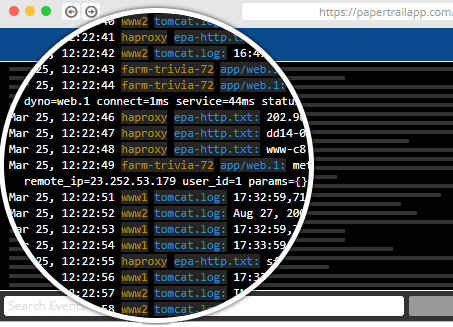Tips from the Team
By engineers, for engineers
At SolarWinds we are software engineers who are passionate about programming, debugging, logging and pretty much everything about building and running applications. We enjoy keeping our coding skills sharp and playing with new technologies. Below are some of things we have picked up along the way.
Fully Functional for 30 Days

Tips for Optimizing Apps Running in Heroku
Traps to Avoid When Setting Up PHP for Heroku
Monitoring WordPress Error Logs With Papertrail
Managing and Analyzing Firewall Logs
Docker Container Logs: 5 Tips to Optimize Logging for Debugging
5 Reasons LaaS Is Essential for Modern Log Management
6 Secrets for Successful Log Management
PHP Logging Tips
Monitor Android Apps to Improve User Experience
5 Reasons Developers Need a Cloud-Based Log Aggregator
Tips for Optimizing Apps Running in Heroku
Heroku is a popular platform-as-a-service (PaaS) cloud that allows you to run your applications in a serverless manner. This blog is about optimizing applications running in Heroku: making them run faster, giving them better security, and generally fine-tuning them.
Traps to Avoid When Setting Up PHP for Heroku
PHP powers millions of applications. This massive success is due to PHP’s simplicity, clear documentation, and tons of free resources. The PHP community provides an incredible ecosystem of libraries and tools, enabling anyone to develop production-grade apps rapidly. What’s even more exciting is PHP projects are cheap to host and widely supported by many platform providers such as Heroku.
Monitoring WordPress Error Logs With Papertrail
Like with any software application, maintaining the app after deployment is critical. It’s important to have methods to check its status when issues inevitably arise. One of the first things most technical professionals will do when diagnosing issues is to check the logs. This way, you can dig deeper into an issue and determine the root cause.
Managing and Analyzing Firewall Logs
Firewalls are a critical part of any organization’s defense in depth strategy. They serve a key role in protecting your network against malicious actors, and they do this well. But they also have a dirty little secret.
Docker Container Logs: 5 Tips to Optimize Logging for Debugging
Docker changed the way developers build software. It solved many issues, but bugs can still occur. When this happens, the first step in the debugging process is usually to read logs. However, when using Docker, this isn’t as straightforward as you may think. You can simply execute docker logs [container_id], but it’s not always possible to use this command, and it’s not an ideal solution for bigger applications. In this post, you’ll learn the pros and cons of the different logging options and what to consider when choosing a logging strategy in Docker.
5 Reasons LaaS Is Essential for Modern Log Management
Today’s applications and services support the core business activities organizations rely on. Service interruptions and downtime time are no longer just inconvenient, they’re directly tied to both lost revenue and customers. It’s more important than ever to actively monitor the health of your applications and services to detect issues before there’s an outage. Being able to quickly detect and resolve issues is key to your organization’s financial and competitive position, as well as your career success.
6 Secrets for Successful Log Management
Logs play a crucial role in any service as they provide tons of information about the wellbeing of your service. For example, logs can contribute important data to metrics, such as the incident rate, retry rate, latency rate, or even the number of issues a user experiences. Logs are also useful for monitoring the health of your service. For example, a high error rate indicates you need to improve the quality of your service to make it more reliable for users.
PHP Logging Tips
Logging is vital for any modern software team, and it’s essential to get it right. A poorly-implemented logging strategy could cause you more headaches than it solves. In this article, we’ll discuss PHP logging and the main best practices you should be aware of and adopt.
Monitor Android Apps to Improve User Experience
Let’s imagine you’re looking for a flight ticket booking app for your Android smartphone. When you search for such an app in the Play Store, you’ll find multiple options. How do you decide which one to install? Easy! You try out a few of them. Find out which one is fastest, serves your purpose, and has a nice user interface.
5 Reasons Developers Need a Cloud-Based Log Aggregator
Logs are often the foundation of metrics and observability infrastructure because they contain business-level statistics that help you and your team make decisions. Without them, it’s impossible to know how often users are hitting errors or how the latencies in your services are varying over time.